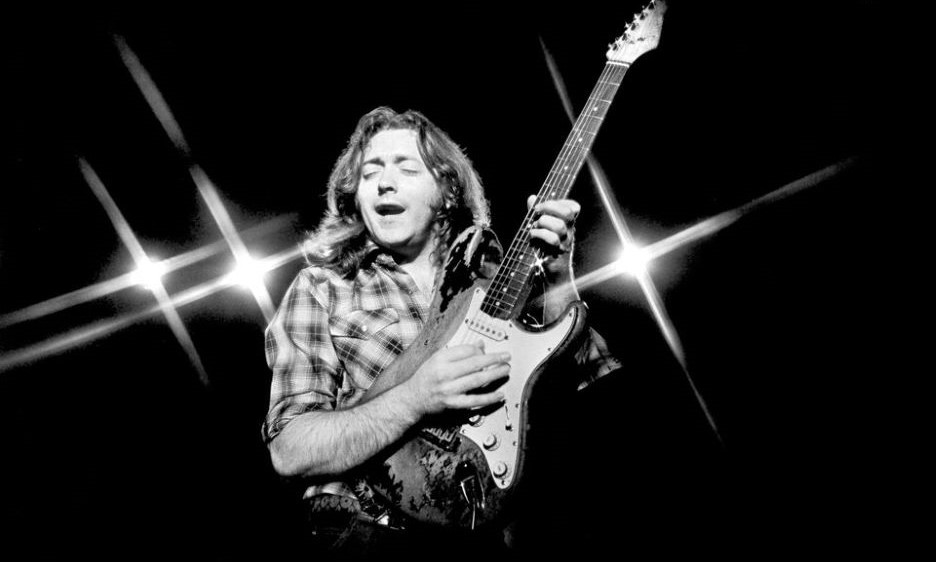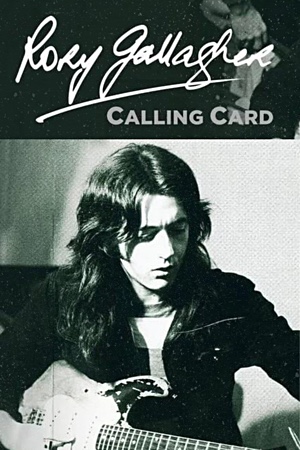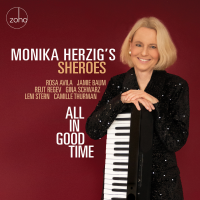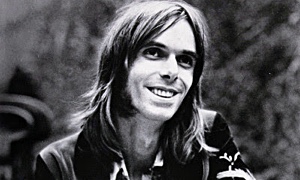Home » Jazz Articles » Film Review » Rory Gallagher: Calling Card
Rory Gallagher: Calling Card

Courtesy Brian Cooke
It was Rory that gave me my sound and that’s the sound I still have.
—Brian May
 Rory Gallagher
Rory Gallagher Rory Gallagher: Calling Card
Dearg Films/Strange Music Limited
Director: Brian Reddin
2024
If street signs named after an artist are any indication of their cultural status then there is no doubting the importance of Rory Gallagher. Streets in at least three cities, including Paris, and a Dublin square, all bear the name of the Irish blues-rock guitarist who died aged 47 in 1995.
The Ballyshannon-born, Cork-raised guitarist's enduring appeal can also be measured in the stream of releases that have flowed since his death. In his lifetime, Gallagher released thirteen studio albums and five live albums. Posthumously, the total number of archival releases (studio sessions and live recordings), box sets and compilations is roughly the same, at time of writing.
There have been several posthumous biographies, of which Riding Shotgun (SPG Triumph, 2005) by Gerry McEvoy (Gallagher's bassist of 20 years) is the most revealing, plus a 2005 BBC radio documentary narrated by Gary Moore.
When it comes to film documentaries, the material is a little thinner. There was Irish Tour '74, Tony Palmer's grainy on-the-road concert film, which captured Gallagher's love of playing live. Over thirty years would pass before Ian Thullier's documentary Ghost Blues: The Story Of Rory Gallagher (2010), which accorded Gallagher a more in-depth and nuanced historical treatment.
Which brings us to Rory Gallagher: Calling Card, first broadcast on RTÉ (Irish national television). Rare concert footage, snippets of interviews with the man himself and a string of contributing interviewees combine to give a rounded picture of Gallagher.
Surprisingly, however, Rory Gallagher: Calling Card resembles Ghost Blues... in almost every respect, from the linear story and images that traces Gallagher's childhood, musical awakening and career development, to the talking heads who appeared in the earlier film. Bob Geldof, The Smiths' Johnny Marr and rock journalist David Fanning all return here, almost fifteen years older, but essentially saying the same things in tribute to Gallagher.
To put it bluntly, Rory Gallagher: Calling Card feels like a remake, covering, in almost exactly the same way, Gallagher's early years playing in an Irish showband, his triumphant appearance at the 1970 Isle of Wight Festival with power trio Taste, the prolific and uncompromising solo artist he became in the '70s, and his somewhat lower key final years.
There are significant new interviewees, notably Queen's Brian May: "One of the main reasons I do what I do is because of Rory, seeing that magic that he had in his fingers. I was completely inspired. It was Rory that gave me my sound and that's the sound I still have."
May is one of an eclectic group of musicians who acknowledge Gallagher's impact, among them blues singer Mary Stokes, Clannad's Moya Brennan and guitar shredder Sophie Lloyd.
Homage aside, it is Imelda May who perhaps comes closest to making sense of Gallagher's shy demeanor off-stage and his visceral, energized persona when playing live. "For many artists, in order to create you have to be an introvert, and in order to perform you have to be an extrovert, and I think that's what messes with the heads of most artists."
What certainly messed with Gallagher's head was a fear of flying, prescription medication and his fondness for alcohol. And as Gallagher's brother and manager Dónal Gallagher notes, Rory Gallagher was a solitary person, given to melancholy and depression. In his later years Rory looked unwell, and his playing had suffered, becoming decidedly ragged. "A few gigs had gone awry on him," admits Dónal, who guides the viewer through his brother's life and career with candid, and at times raw honesty.
It is Dónal Gallagher's guiding hand that marks the main difference between the two films. An interviewee in Ghost Blues, Dónal Gallagher takes the lead in Rory Gallagher: Calling Card, interviewing Rory's former bandmates, the guitarist's agent Paul Charles and the broadcasters and music journalists who followed his brother's journey from start to finish.
What emerges is not just a portrait of an outstanding musician, but of a groundbreaking figure in terms of Irish music history. As Mamas Boys guitarist Pat McManus duly notes, Rory Gallagher was Ireland's first rock star, blazing a trail against the backdrop of the ultra-conservative Irish society of the time.
Importantly too, Gallagher proved a unifying figure—and a beacon of joy—in the gloomy, politically fraught Northern Ireland of the '70s and '80s.
It is easy to forget at these removes, in this age of instant stardom, You Tube channels, social media platforms, and stadium residencies that Gallagher, who steadfastly refused to release singles, sold upwards of 30 million albums the hard way, by playing countless gigs, many of them in small venues.
Head-hunted by The Rolling Stones, invited to recording sessions by Jerry Lee Lewis and Muddy Waters, and an inspiration to several generations of guitarists, Gallagher's reputation and legacy has only grown in the decades since his death.
Ultimately, Gallagher comes across as a tragic figure, a victim of his own insecurities and dependencies, a solitary man who seemed lost when not on the road, yet increasingly worn by the tolls of touring and his unhealthy lifestyle. In the end, it was an MRSA bug, contracted when in hospital for a liver transplant, that caused his demise. "What a waste," laments Gerry McEvoy. "What a terrible waste."
Still, the enduring impact that Rory Gallagher had on all those who experienced his music, especially live, is a major takeaway from this well-crafted, thoughtful film. "He communicated through his music," says broadcaster/rock journalist David Fanning. "He got lost in his music and we got lost with him. It was as simple as that."
Rory Gallagher: Calling Card may qualify as a remake, but it has a definitive feel to it.
Tags
Film Review
Rory Gallagher
Ian Patterson
Ireland
Cork
Ghost Blues: The Story Of Rory Gallagher
The Rolling Stones
Jerry Lee Lewis
Muddy Waters
Gerry McEvoy
Brian May
Taste
Irish Tour '74
Ian Thullier
Brian Reddin
Mary Stokes
Johnny Marr
Imelda May
Clannad
Isle Of Wight 1970
David Fanning
Bob Geldof
PREVIOUS / NEXT
Support All About Jazz
 All About Jazz has been a pillar of jazz since 1995, championing it as an art form and, more importantly, supporting the musicians who make it. Our enduring commitment has made "AAJ" one of the most culturally important websites of its kind, read by hundreds of thousands of fans, musicians and industry figures every month.
All About Jazz has been a pillar of jazz since 1995, championing it as an art form and, more importantly, supporting the musicians who make it. Our enduring commitment has made "AAJ" one of the most culturally important websites of its kind, read by hundreds of thousands of fans, musicians and industry figures every month.

























